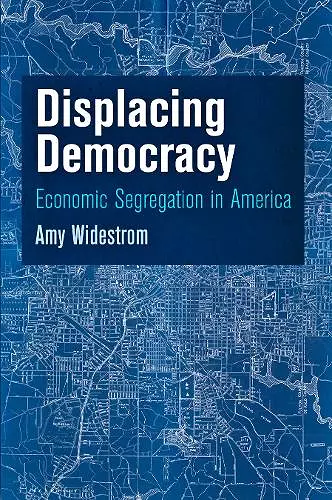Displacing Democracy
Economic Segregation in America
Format:Hardback
Publisher:University of Pennsylvania Press
Published:12th Jan '15
Currently unavailable, and unfortunately no date known when it will be back

Displacing Democracy demonstrates how neighborhoods segregated along economic lines create conditions encouraging high levels of political activity, including civic and political mobilization and voting, among wealthier citizens while simultaneously discouraging and impeding the poor from similar forms of civic engagement.
In recent decades, economically disadvantaged Americans have become more residentially segregated from other communities: they are increasingly likely to live in high-poverty neighborhoods that are spatially isolated with few civic resources. Low-income citizens are also less likely to be politically engaged, a trend that is most glaring in terms of voter turnout. Examining neighborhoods in Atlanta, Kansas City, Milwaukee, and Rochester, Amy Widestrom challenges the assumption that the "class gap" in political participation is largely the result of individual choices and dispositions. Displacing Democracy demonstrates that neighborhoods segregated along economic lines create conditions that encourage high levels of political activity, including political and civic mobilization and voting, among wealthier citizens while discouraging and impeding the poor from similar forms of civic engagement.
Drawing on quantitative research, case studies, and interviews, Widestrom shows that neighborhood-level resources and characteristics affect political engagement in distinct ways that are not sufficiently appreciated in the current understanding of American politics and political behavior. In addition to the roles played by individual traits and assets, increasing economic segregation in the United States denies low-income citizens the civic and social resources vital for political mobilization and participation. People living in poverty lack the time, money, and skills for active civic engagement, and this is compounded by the fact that residential segregation creates a barren civic environment incapable of supporting a vibrant civic community. Over time, this creates a balance of political power that is dramatically skewed not only toward individuals with greater incomes but toward entire neighborhoods with more economic resources.
"Displacing Democracy sets out to challenge and complicate a story that is often understood as an easy equation between individual resources and individual political behavior: most rich people vote, most poor people don't. Amy Widestrom's fine book recasts this as a challenge of political engagement under conditions of stark economic segregation. What matters, in the end, is where you live-and the ways in which civic infrastructure and civic resources can sustain (or sap) democratic participation." * Colin Gordon, University of Iowa *
- Winner of Winner of the 2016 Clarence Stone Scholar Award from Urban and Local Politics Section of the American Political Science Association 2021
ISBN: 9780812246599
Dimensions: unknown
Weight: unknown
264 pages